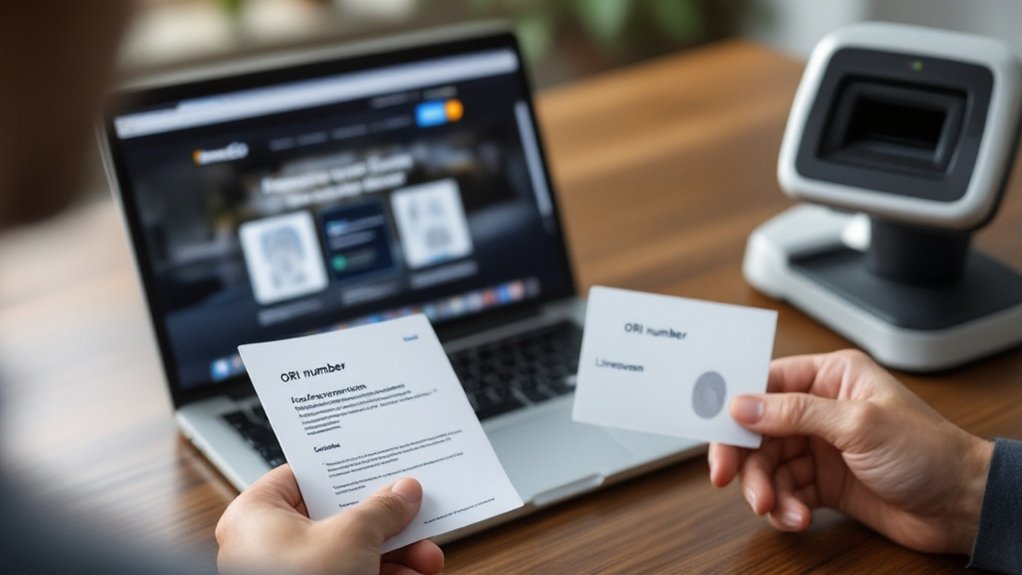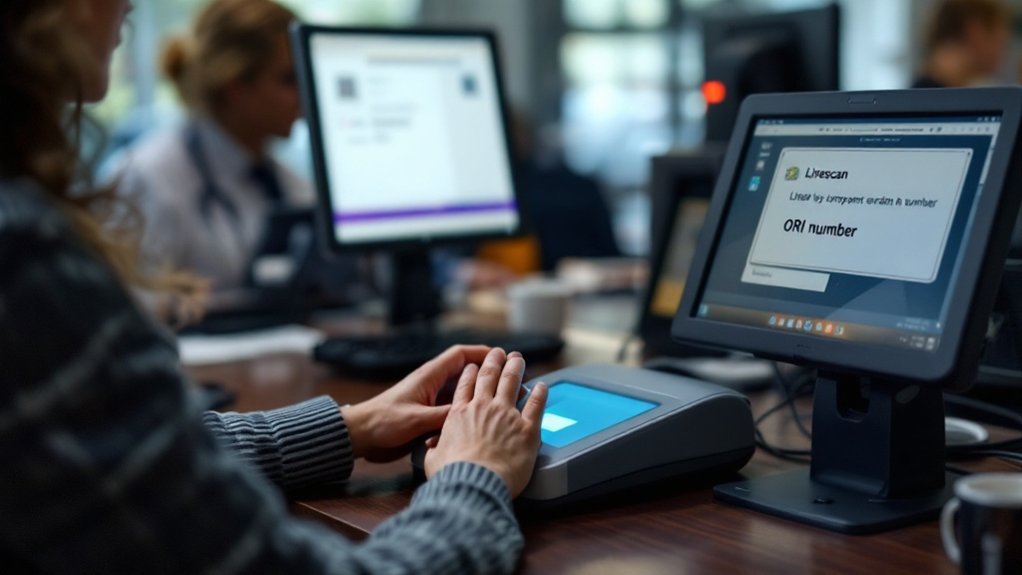To submit fingerprints with an ORI number in Florida, you’ll need to use Livescan fingerprinting. This process involves electronically capturing your fingerprints, which are then sent to the Florida Department of Law Enforcement (FDLE) for processing. You’ll receive a Transaction Control Number (TCN) to track your background check status. Guarantee the ORI number is correct to ascertain proper routing of results. For more details on the process and resolving common issues, continue with the next steps.
Understanding ORI Numbers

When submitting fingerprints in Florida, understanding the role of an ORI number is essential. An ORI, or Originating Agency Identifier Number, is a unique identifier assigned to agencies for fingerprinting services. It specifies which agency should receive background check results and the purpose of the check. Typically, an ORI number is a 9-character alphanumeric code, often starting with letters followed by numbers. In Florida, ORI numbers are required for Level 2 background checks, ensuring that results are sent to the correct agency. Examples include ORI numbers for AHCA or DCF, which direct results appropriately. The assignment of an ORI number involves meeting established qualifying criteria, including demonstrating a legal authority to access criminal justice information, which is validated by the FBI CJIS.
Obtaining an ORI Number
To obtain an ORI number in Florida, you typically receive it from your employer or the agency requiring the background check. If it’s not provided, you can contact the relevant regulatory agency for assistance. It’s imperative to verify the ORI number to guarantee it matches your profession or license, as incorrect numbers can delay or prevent the processing of background check results.
Source of ORI
Obtaining an ORI number in Florida involves understanding its source and purpose. An ORI is a unique identifier assigned by the FBI’s CJIS Division to law enforcement agencies. It identifies the agency requesting criminal justice information and restricts access based on duties. Typically, an ORI is a nine-character identifier containing both alpha and numeric characters.
To obtain an ORI, requests must come from the state or federal CJIS Systems Agency (CSA) or its designee. Agencies must document their criminal justice authority and functions. The FBI CJIS Division reviews and approves these requests. In Florida, ORIs are fundamental for Livescan fingerprinting, ensuring that prints are correctly routed to the requesting agency. For instance, when submitting fingerprints for Florida state compliance, applicants must provide the correct ORI number to ensure that their prints are processed by the appropriate agency.
Obtaining ORI**
In Florida, you typically receive an ORI number from the agency or organization requesting your fingerprints, such as an employer or regulatory body. This number is essential for Level II background checks, ensuring that your fingerprint results are sent to the correct agency. Employers must provide the ORI number for job-related background checks, while regulatory agencies can be contacted for specific ORI numbers. For court-related matters, you can obtain ORI information from the Clerk of Court.
To obtain an ORI number, you can also contact the relevant regulating agency directly. Each ORI number is unique and associated with a specific agency, ensuring that background check results are routed correctly. The ORI number serves as a crucial identifier, acting as a 9-digit code that links the background check to the specific agency requesting it.
Livescan Fingerprinting Process

When you undergo Livescan fingerprinting in Florida, you’ll use a digital scanner to capture your fingerprints electronically, which are then submitted to the Florida Department of Law Enforcement (FDLE) for processing. This process typically takes about 10 to 15 minutes and offers advantages like faster processing times and reduced errors compared to traditional ink-and-paper methods. After submitting your fingerprints, you’ll receive a Transaction Control Number (TCN) to track the status of your background check, which usually takes three to five business days to complete. It is crucial to provide the correct ORI number to ensure that your fingerprints are processed correctly and sent to the appropriate agency.
Fingerprint Submission
To submit fingerprints using Livescan technology in Florida, you’ll need to select a provider approved by the Florida Department of Law Enforcement (FDLE). Guarantee you have the correct Originating Agency Identification (ORI) number to direct your fingerprints to the right agency. Register with a provider like IdentoGO and pay the fee, which typically ranges from $36 to $50.75 plus tax. At the Livescan location, your fingerprints will be captured electronically and submitted to the FDLE for processing. This method is faster and more accurate than traditional fingerprint cards. After fingerprinting, you’ll receive a Transaction Control Number (TCN) for future reference.
Processing Timeframe**
The Livescan fingerprinting process in Florida typically yields results within a few days, with most departments receiving them between two to five days after submission to the Florida Department of Law Enforcement (FDLE). This speed is due to the digital nature of Livescan, which allows for quick transmission and processing of fingerprints. You’ll benefit from clearer and more accurate images compared to traditional ink methods, reducing errors and speeding up the overall process. Once your fingerprints are submitted, you’ll receive a Transaction Control Number (TCN), which can be used to track the status of your application.
Traditional Fingerprinting Methods
Traditional fingerprinting methods involve applying ink to each finger, which are then rolled across a fingerprint card to capture the prints. This manual process is more prone to errors and smudging, making it time-consuming and less efficient compared to electronic methods. The results may take longer to process, and the cards are typically submitted by mail. Proper identification is necessary, and local law enforcement may assist with the process. In Florida, electronic fingerprinting is preferred due to its efficiency and accuracy, often requiring an ORI number for submission to the Florida Department of Law Enforcement. In contrast to electronic methods, traditional fingerprinting uses ink and requires a specific card. It is error-prone, leading to illegible prints, and not all agencies accept traditional cards. Electronic methods offer faster processing and cleaner results, making them more convenient and efficient.
Non-Resident Fingerprinting Procedures

When submitting fingerprints as a non-resident in Florida, you have several options. You can use Livescan devices at approved service providers if available, or opt for hard card scanning if Livescan is not accessible. For hard card scanning, you must obtain standard FBI fingerprint cards from a law enforcement agency or authorized vendor and mail them to an approved provider for electronic conversion.
You will need to contact approved providers directly for specific processes. Guarantee you have the correct ORI number from the requesting agency, as it is pivotal for receiving fingerprint results. Be aware that hard card submissions may not be shared in clearinghouses and may incur additional costs.
Fingerprinting for Licensure Purposes
Fingerprinting is a mandatory step for most licensure applications in Florida, including those regulated by the Department of Business and Professional Regulation (DBPR) and the Florida Department of Financial Services. You must use FDLE-approved Livescan service providers to submit fingerprints electronically. An Originating Agency Identification (ORI) number is required to guarantee results are sent to the correct agency. You are responsible for the cost and confirming correct submission. When selecting a provider, choose from the list of FDLE-approved Livescan service providers. The cost varies and is typically paid directly to the provider. Guarantee you use the correct ORI number to avoid delays in processing your application. Fingerprints are submitted electronically to the FDLE, which then shares the results with the relevant department. Additionally, applicants must pay the fingerprinting fee online, which includes a base cost plus local taxes.
Resolving Common Issues With Fingerprint Submissions**

How do you handle issues that arise during the fingerprint submission process in Florida? If your fingerprints are rejected due to poor quality, the Florida Department of Law Enforcement (FDLE) will notify the requesting agency and possibly you. You can resubmit your fingerprints at no additional cost within a specified timeframe, typically 90 days. To improve quality, wash your hands thoroughly and avoid lotions before the scan. If rejected multiple times, alternative verification methods may be considered. To guarantee successful submissions, use an experienced Live Scan technician and follow preparation tips. Always include the required Originating Agency Identifier Number (ORI) to direct prints to the correct agency. Additionally, during the resubmission process, it is crucial to work with a certified Live Scan provider to ensure accurate and timely processing of your fingerprints.
Conclusion
You’ve successfully navigated the process of submitting fingerprints with an ORI number in Florida. But what happens next? Will your background check reveal any surprises? The suspense builds as you wait for the results. Guarantee your ORI number is correct, and your fingerprints are submitted accurately to avoid delays. The outcome could change everything—will you pass the screening?

